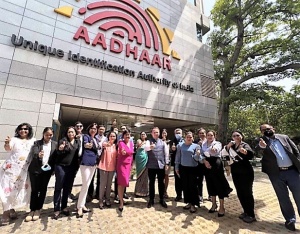
As part of its commitment to gain experience towards the achievement of digital transformation in the delivery of basic services to all Filipinos, the Department of Social Welfare and Development (DSWD), together with the Philippine Statistics Authority (PSA), participated in a Knowledge Exchange Visit in India recently through the initiative and sponsorship of the World Bank.
During the said visit, representatives from the DSWD engaged with the Unique Identification Authority of India (UIDAI) and studied the design, registration, and implementation process of the national digital ID system of India, known as the Aadhaar. The Philippine delegates experienced, firsthand, the process of registration up to the receipt of the financial and material assistance provided by the government of India to their beneficiaries.
Participants from the DSWD also interacted with one of the stakeholders and private sector partners of India, the Bank of Baroda. The visit enabled them to study how India allows its constituents, as young as 0-5 years old, to benefit from the national ID system.
It can be recalled that a Memorandum of Agreement (MOA) was forged between the DSWD and the PSA to adopt the Philippine Identification System (PhilSys) in the identification and verification of the beneficiaries of the Department, starting with the two main social welfare programs namely, the Pantawid Pamilyang Pilipino Program (4Ps) and the Assistance to Individuals in Crisis Situation (AICS) which cater to 4 million to 7 million beneficiaries, combined.
By virtue of the MOA, the integration of the PhilSys with the 4Ps and AICS will be pilot tested, especially the authentication of the identity of the applicant-beneficiaries using the PhilSys IDs.
The goal of the agreement was to adopt the PhilSys and use it for the Department’s Digital Transformation Success onward, in order to efficiently and effectively serve the beneficiaries of its social protection programs while preventing fraud and unauthorized disclosure of confidential information as well as decreasing the expenses for these since verification and business processes will be automated.
Moreover, the DSWD is now developing a unified beneficiary database that aims to contain up-to-date and consistent information about the beneficiaries across all programs of the Department which will help prevent ghost and duplicate beneficiaries.
The DSWD commits to innovating and ensuring that the Department is ready to respond to the challenges of the new decade and be able to develop and explore strategies to provide prompt, genuine, and compassionate service to the poor, marginalized, and vulnerable sectors of the society. ###


